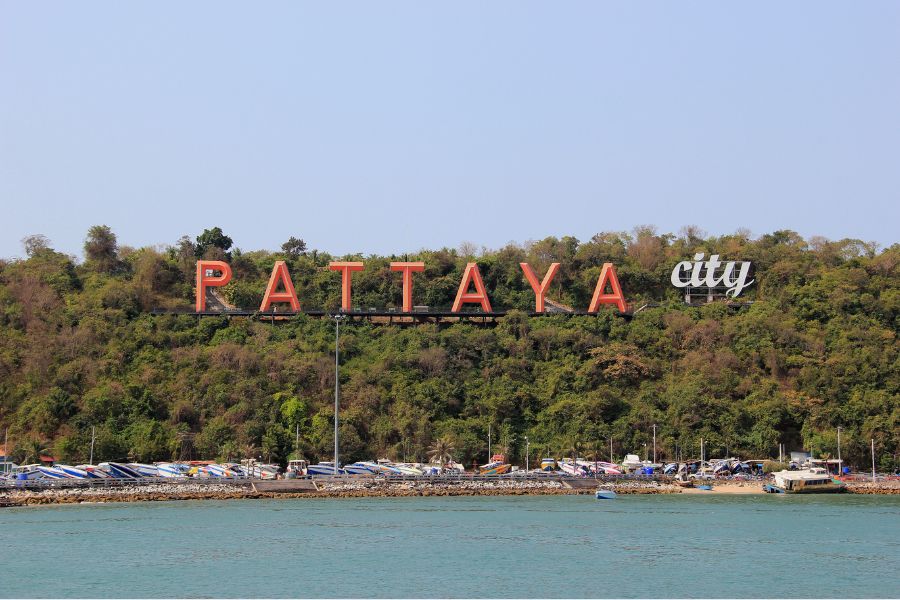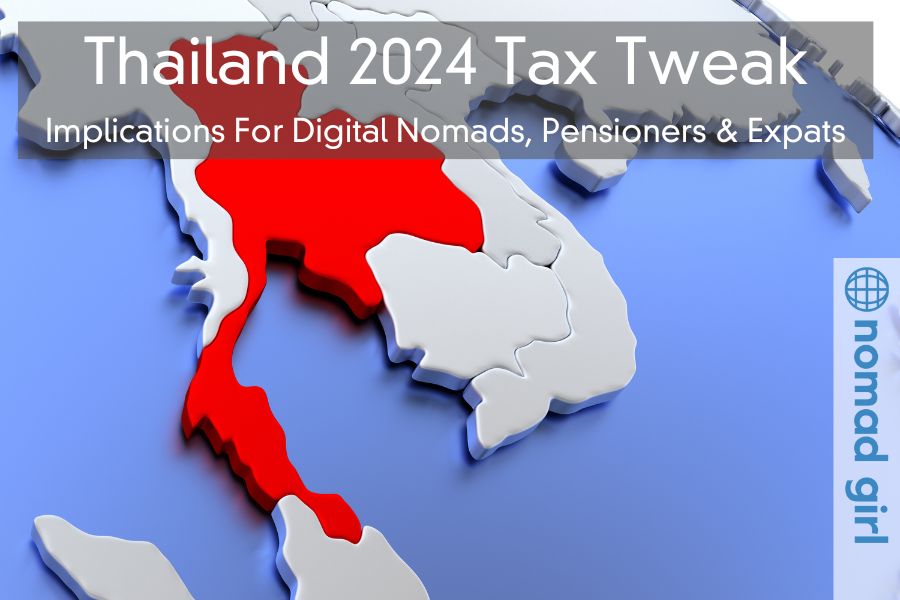The Thailand 2024 tax tweak regarding how remittances are treated will have major tax implications for digital nomads, pensioners and expats residing in the country for more than 180 days per tax year.
In the article, Nomad Girl breaks down the tax change, the implications and the workaround.
Thailand Territorial Taxation with Tax Based on Remittance
Thailand operates under a territorial taxation system with remittance-based taxation. Until 2023, foreign income wasn’t taxed if it wasn’t remitted to Thailand in the same tax year.
For example, it would be tax-free if you received income or dividends in 2022 and transferred it to Thailand in 2023.
However, income remitted within the same tax year it was earned would be taxable; so if you earned $100,000 in 2023 and remitted $30,000 of that in the same year, only the $30,000 would be subject to tax. Conversely, remitting $30,000 of your 2022 earnings in 2023 would not incur tax.
Starting in 2024, a significant tax change has been implemented: all remitted money will now be taxed, eliminating the previous exemption for earnings from past tax years.
Thai tax residents still benefit from only being taxed on Thai income and remitted income, unlike some countries that tax global income.
This regulation originated from a need to prevent double taxation for Thais working abroad due to the limited number of double taxation agreements.
However, the relevance of this rule diminished as Thailand expanded its double tax agreements and as wealthy Thai families and businesses structured their assets offshore to minimize taxes.
The current government intends to counter this by enforcing remittance-based taxes and motivating Thai families and businesses to invest domestically rather than offshore.
This change, while rational from a tax policy perspective, inadvertently affects a significant foreign population in Thailand, including digital nomads, pensioners, and expats who consider Thailand their semi-permanent or permanent home.
The impact on each of these groups merits further examination.
Expats with foreign-sourced income
Numerous expats with income from abroad have chosen Thailand as their preferred place of residence, largely attracted by the possibility of living tax-free.
This benefit was balanced against several trade-offs: the necessity to secure private health insurance, cover private education costs and navigate the complexities of Thailand’s visa system, which includes frequent renewals, visa runs, and sometimes even bribes.
An alternative to mitigate some of these visa challenges was obtaining the costly Thailand Privilege Card.
Additionally, expats face the challenge of owning property in Thailand, a process not particularly accommodating to foreigners.
The advantage was evident: with careful planning, one could reside in Thailand without incurring taxes.
However, the new tax on all remittances may deter current and potential expatriates from choosing Thailand, leading them to return to their home countries where taxes contribute to free healthcare and education for children.
This is a considerable factor unless one opts for Thai schools and relies on local healthcare, which significantly differs in quality from private healthcare services.
Pensioners
Thailand is a great destination for pensioners. Its low cost of living, fantastic weather, affordable street food and dare I say it Thai women, make it the ultimate destination for a lot of pensioners.
All they had to deal with was some bureaucracy with the yearly renewal of the retirement visa, the fees and agency fees that come with it and the cost of a private health insurance plan.
With some careful planning, you could receive your pension money and other passive investments tax-free. With the new taxation, everything you remit will get taxed.
Pensions have varied tax implications; some are taxed in the country of origin, while others are exempt.
With the new taxation of pensions in Thailand, it’s important to check for double tax agreements to avoid being taxed twice on the same income.
Thailand currently has double tax agreements with 61 countries.
The introduction of tax on previously tax-free pensions in Thailand could lead pensioners to consider relocating to the Philippines, which offers a more favourable tax environment.
Additionally, countries like Italy and Greece provide advantageous 7% flat tax conditions for pensioners, without the requirement of costly health insurance or the complexities of annual visa renewals.
For European retirees, these closer-to-home options might now seem more appealing.

What will happen to Pattaya if a huge number of its foreign pensioners leave?
Digital Nomads
Digital nomads living in Thailand typically use tourist visas or visa exemption programs.
They extend their stays by obtaining a 30-day extension from the local immigration office and occasionally performing a “visa run,” which involves briefly visiting a neighbouring country before returning to Thailand.
This practice is common because the Long Term Residency (LTR) scheme, often marketed as a digital nomad visa, is very challenging to obtain for the majority of digital nomads.
It is designed for wealthy individuals seeking residency for up to 10 years, making it less accessible for the typical digital nomad.
Thailand is aware of its popularity among digital nomads, as evidenced by its top ranking on Nomadlist.com.
The country appears to adopt a lenient approach towards remote workers, as long as their work doesn’t replace local employment.
Despite the previous remittance tax scheme, taxation on digital nomads has not been actively enforced, and it’s uncertain if the new remittance tax changes will be more strictly implemented.
A significant shift in policy might only occur if Thailand starts issuing tax identification numbers to tourists who stay for over 180 days in a tax year, or if immigration officers begin inquiring about tax matters for those exceeding this duration.
However, digital nomads using tourist visas have the flexibility to move to other countries like Malaysia, Vietnam, Indonesia, or the Philippines, to avoid surpassing the 180-day threshold within a Thai tax year.
The future implications of these changes for digital nomads remain to be seen.
Digital nomads that use the education visa a retirement visa, or the LTR visa to stay longer in Thailand have the same implications as expats with foreign-sourced income.
Thailand Digital Nomad Visa & Alternatives – All Visa Options Explained
The Work Around for Now
For Digital Nomads, Expats, and Pensioners, the most effective approach is proactive planning.
A key component of this strategy involves having a Thai bank account, which has become somewhat more challenging to acquire recently.
The idea is to transfer funds to Thailand for property purchases and estimated living expenses for as far into the future as you can manage or finance, in a year when you are not considered a tax resident in Thailand.
You are not deemed a tax resident if you spend fewer than 180 days in Thailand during a tax year, which runs from January 1 to December 31.
Not everyone has the funds or the necessary Thai bank account to do so but this is the only legal workaround that exists.
The Competition
Meanwhile, the competition in South East Asia is not sitting still.
- $25 e-visa scheme for all countries allowing 90-day stays. It is easy, not bureaucratic and cheap.
Malaysia
- 90-day visa exemptions for a lot of countries.
- A digital nomad visa with tax-free status for 2 years.
- MM2H (Malaysia My Second Home) program for wealthy pensioners, and expats with foreign-sourced income with territorial taxation benefits.
Philippines
- Retirement visas, starting at the age of 35, with territorial taxation benefits.
- A digital nomad visa is in the works.
Implications
The future consequences of these tax changes in Thailand remain uncertain for now.
The local saying “This is Thailand” hints at the possibility that what is planned might not be fully implemented.
There could be amendments in the tax code or the introduction of new visa categories to mitigate the impact on specific groups like digital nomads, expats, and pensioners.
If Thailand begins issuing tax identification numbers to tourists staying over 180 days, as well as to pensioners and expats reliant on income from abroad, the repercussions could be significant.
This move could lead to a substantial departure of these groups from Thailand.
It would particularly affect the large community of foreign pensioners and expats, marking an end to Thailand’s status as a tax-advantaged destination and potentially rendering the Thailand Privilege Card – an expensive long-term visa program – obsolete.
Despite recovering from the COVID-19 pandemic, with tourism figures reaching 28 million visitors, Thailand still falls short of the 40 million visitors it had in 2019, largely due to reduced Chinese tourism.
For a country heavily reliant on tourism, the ongoing visa complexities, the steep increase in the cost of the Thailand Privilege Card, and the new taxation on remittances could be seen as a disjointed approach to tourism strategy.
Thai Visa Mess
Nomad Girl has come up with some new inventive ways on how to solve Thailand’s current visa mess. This plan has been put forward to the Thai Tourism Authority and immigration department.


















